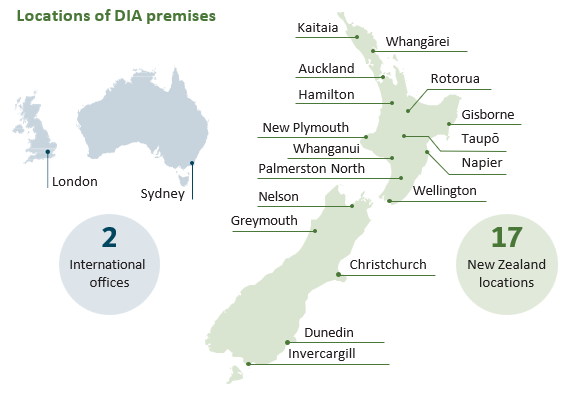- ANNUAL REPORT
2024-2025 - SECTION 1
Our year in review - SECTION 2
Progress on Strategic Intentions - SECTION 3
Assessment of operations - SECTION 4
Organisational health and capability - SECTION 5
Annual and forecast financial statements - SECTION 6
Statement of Expenses and Capital Expenditure - SECTION 7
Auditor's Report - SECTION 8
Appendices - Ministry for Ethnic Communities
- Digital Executive Board
- Trust Framework Authority and Trust Framework Board
- Non-departmental Appropriations 2024/25 Report
Go to the Contents View or download the PDF version Go to the next section
1. Our year in review

In this section:
Statement of responsibility
I am responsible, as Secretary for Internal Affairs, for:
- the preparation of the Department of Internal Affairs’ financial statements, and statements of expenses and capital expenditure, and for the judgements expressed in them;
- having in place a system of internal control designed to provide reasonable assurance as to the integrity and reliability of financial reporting;
- ensuring that end-of-year performance information on each appropriation administered by the Department of Internal Affairs is provided in accordance with Sections 19A to 19C of the Public Finance Act 1989, whether or not that information is included in this annual report; and
- the accuracy of any end-of-year performance information prepared by the Department of Internal Affairs, whether or not that information is included in this annual report.
In my opinion:
- the annual report fairly reflects the operations, progress, and organisational heath and capability of the Department of Internal Affairs;
- the financial statements fairly reflect the financial position of the Department of Internal Affairs as at 30 June 2025 and its operations for the year ended on that date; and
- the forecast financial statements fairly reflect the forecast financial position of the Department of Internal Affairs as at 30 June 2026 and its operations for the year ending on that date.

Paul James
Secretary for Internal Affairs
30 September 2025
![]()
Sharyn Mitchell
Chief Financial Officer
30 September 2025
Secretary of Internal Affairs’ foreword
Tēnā tātou
The Department of Internal Affairs plays a role in the everyday lives of New Zealanders. I’m proud to share this report and reflect on the positive impact we have made over the past year.
This year we have made substantial progress across several major areas.
The new National Archives building was completed with kaimahi beginning to move in from July 2025. A public opening is planned for 2026.
The Local Water Done Well policy addresses New Zealand’s long-standing water services challenges by giving councils choice in how local services are managed.
The Water Services team developed guidance and information for councils to assist their consultation with communities
and to develop water services delivery plans. The first water services delivery plan was received in mid-June 2025 and accepted by myself as Secretary for Local Government.
This year has also been one of continued change, as we focused on increasing efficiency and reducing costs. In August 2024, we launched a Fiscal Sustainability Programme, a two-phase initiative to reset and resize our organisational structure.
Phase 1, completed in February 2025, focused on leadership restructuring - reducing branches and senior leadership roles, and realigning functions for greater efficiency and accountability.
Phase 2, launched in March 2025, is streamlining management layers, removing duplicate support roles, and optimising corporate services.
From 1 July 2025, the National Library and Archives New Zealand has operated under a new joint leadership model, led by the National Librarian and Chief Archivist. This model supports shared aspirations and is expected to save around $2.5 million. The statutory responsibilities of both institutions remain unchanged.
We modernised core systems, including the roll out of a new Health & Safety management system and the migration of HR, Privacy, Property, and Security workflows onto our central platform. We transitioned our enterprise content management system and intranet to SharePoint Online - laying a more connected foundation for future work.
I want to acknowledge the commitment and resilience of our people. Despite change, they’ve continued to strengthen the services we provide to New Zealanders every day.
We also couldn’t do our work without strong partnerships. I extend my sincere thanks to our colleagues across government, local authorities, iwi, Māori and community partners. Your collaboration and commitment have shaped much of what we’ve achieved this year.
The Local Government (Water Services) Bill, which sets out comprehensive enduring settings for water services, was reported back from select committee in early July and is expected to pass remaining legislative stages shortly.
Our Digital Services team developed a Roadmap to modernise how citizens and businesses interact with government. We also advanced our work to safely use Artificial Intelligence (AI) across the public sector, publishing the Public Service AI Framework and Responsible AI Guidance, launching a new Community of Practice, and providing AI training and tools for agencies.
Our Identity Services group implemented the Citizenship (Western Samoa) (Restoration) Amendment Act 2024, restoring citizenship to people unfairly deprived of it over four decades ago. As of 30 June 2025, 2,011 people have been granted citizenship through this work.
We also took decisive steps to disrupt criminal scam campaigns. Our Digital Messaging team led Operation Orca, dismantling a sophisticated scam operation and partnering with Apple to improve real-time scam reporting for iPhone users in New Zealand.
Looking ahead, we face a rapidly evolving environment shaped by fiscal constraints, technological advancement, and rising public expectations. These pressures also present opportunities - to innovate, modernise how we serve, and to deliver smarter, more accessible services.
Over the coming year, we will refresh both our organisational strategy and our Strategic Framework for Working Effectively with Māori. From 25 September 2025, we also take on hosting responsibility for the National Emergency Management Agency.
We remain focused on adapting with purpose, embracing change, and strengthening our impact for the people of New Zealand.
Thank you to all who contributed to our success this year.
I’m proud of what we’ve achieved and I look forward to continuing our journey together in service of a stronger, more inclusive Aotearoa New Zealand.
Included in this Annual Report is reporting for the Ministry for Ethnic Communities and the Digital Executive Board, which are included in Vote Internal Affairs. It is also the first year we have included reporting on the Trust Framework Board and the Trust Framework Authority.
Ngā mihi nui

Paul James
Secretary for Internal Affairs, Secretary for Local Government,
Government Chief Digital Officer, Chief Executive of the Department of Internal Affairs
Highlights
Developed Online Casino Gambling legislation to establish a licensing regime to protect consumers, minimise gambling harm, limit opportunities for crime and dishonesty, and provide regulatory oversight of online gambling providers operating in New Zealand.
Worked with the Ministry of Foreign Affairs and Trade and the Department of Prime Minister and Cabinet to develop a framework for welcoming Heads of Government to New Zealand. The framework ensures clear roles and consistent, successful delivery of official visits.
The Chief Archivist Poumanaaki apologised to survivors of abuse in care for failings in the effective monitoring of government recordkeeping by Archives New Zealand.
Worked with local government to identify water service delivery options that support councils in overcoming financial sustainability challenges.
Over 842,000 reports of potential scams were received by the 7726 text message service and the Digital Child Exploitation Filtering System blocked over 735,000 attempts to access websites hosting child sexual abuse material.
Delivered the first Regional Deals Strategic Framework detailing how these long-term partnerships between central and local government will promote economic growth, deliver infrastructure and improve the supply of quality housing across Aotearoa.
89 water treatment sites installed and provided safe drinking water to rural communities – reducing health risks for communities who otherwise would not meet drinking water standards.
Digitised and preserved over 400,000 audio visual items into formats the public can access and use, including music, oral histories, recordings of community events, news and current affairs, documentaries, TV series and films.
Granted New Zealand citizenship to 2,011 people, mostly born in Samoa and had their citizenship unfairly removed in 1982.
More than 75,000 people have successfully used the new Identity Check facial recognition service to verify their identity.
About us
Our Executive Leadership Team
Our Executive Leadership Team (ELT) includes the Secretary for Internal Affairs, six Deputy Secretaries and the Director of the Office of the Secretary.
|
Paul James Secretary for Internal Affairs Secretary for Local Government and Government Chief Digital Officer |
|
|
Karen Hope-Cross Director, Office of the Secretary |
|
|
Katrina Casey Acting Deputy Secretary Local Government |
Melanie Carpinter Acting Deputy Secretary Policy and Te Tiriti |
|
Hoani Lambert Deputy Secretary Partnerships and Commissions |
Darrin Sykes Deputy Secretary Enterprise Services |
|
Myles Ward Deputy Secretary Digital Services Deputy Government Chief Digital Officer |
Rachel Leota Deputy Secretary Regulatory and Identity Services |
Our governance
Our governance system helps ensure we deliver on our purpose, strategic priorities and stewardship roles, and achieve sound and sustainable long-term decision-making.
Governance is collectively led by the ELT and supported by two sub-committees:
- Finance and Investment: provides assurance that the Department has the capability to deliver our strategy, maintain financial sustainability and manage our investment portfolio effectively.
- Performance, Risk and Assurance: oversees the Department’s approach to non-financial performance, risk management, and assurance practices, providing strategic direction and oversight.
We also have an External Advisory Committee that provides independent advice to the Secretary for Internal Affairs and the ELT on its management and governance responsibilities. This includes guidance on strategic direction, systems of governance, risk and assurance, organisational performance, and the integrity of performance information.
Our risk and assurance
Effective risk and assurance systems and good practices are key components of effective governance. Good risk management practice helps us identify key risks to delivery and enables early intervention before risks impact on outcomes. Our assurance processes support governance bodies in their decision- making, provides evidence of how well business risks are being managed, whether opportunities are being taken, and how well the business is performing. Applying more consistent risk and assurance advice and support over priority and/or higher-risk projects and programmes is helping to embed good risk management practices as integral to our mahi, and ensure we focus on the right things. Our Assurance Policy and Framework supports an integrated view of assurance.
Our locations
The Department has 17 locations nationwide and two overseas - Sydney and London.

Return to Contents View or download the PDF version Go to the next section